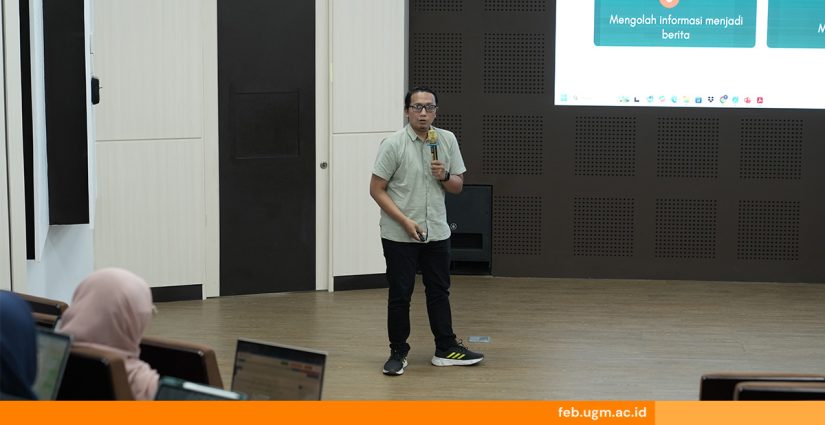
In the digital era and information disclosure, the role of public relations in higher education is becoming increasingly important to maintain the image and reputation of the institution. PR practitioners must be able to convey information quickly, accurately, and interestingly through various channels, both text and visual. News writing skills that are by journalistic rules are one of the essential things that need to be mastered by public relations staff.
Kompas DIY Bureau Chief Haris Firdaus said journalists and public relations practitioners have equally essential responsibilities in mass communication but carry out different roles. Suppose journalists are tasked with voicing public interests in the issue of independence. In that case, public relations practitioners are obliged to maintain the image of the institution while still prioritizing ethical and responsible journalistic principles.
The fundamental understanding of the difference in roles was one of the main points delivered by Haris in the Public Relations News Writing Training organized by the Faculty of Economics and Business, Universitas Gadjah Mada (FEB UGM) on May 19, 2025. The training was held to equip public relations staff at FEB UGM with the skills to write news for public relations using journalistic rules.
On this occasion, Haris conveyed the five main stages of journalistic activities: information search, verification, data processing into news scripts, editing, and publication. Each stage is interrelated and designed to ensure the information conveyed to the public is factual, accurate, and ethically accountable.
Participants were also introduced to four main types of journalistic reports: straight news, feature, in depth reports, and investigative reports. Among these, straight news is the most fundamental and commonly used form in daily journalistic practice. This type of news is characterized by an inverted pyramid structure, where the most important information is placed at the beginning of the article. Writers must clearly and concisely answer the 5W+1H questions (what, who, when, where, why, how).
In writing straight news, clarity and efficiency are key. Sentences should be short, direct to the point, and avoid unnecessary elaboration. Additionally, choosing the right angle is important so that the news has a clear focus and delivers maximum informational impact.
Unlike straight news, feature writing provides more room for narrative and creativity. Information does not have to be presented immediately at the start but can begin with visual descriptions, interesting quotes, or short stories that evoke readers’ emotions. However, factual accuracy remains the foundation.
The training also covered the use of journalistic language, which must be clear, objective, and free from clickbait. This is particularly important in the context of institutional public relations. Headlines and news content that are overly sensational can damage an institution’s credibility. Therefore, a balance between attractiveness and the integrity of information must be maintained.
Participants were encouraged to distinguish the roles between journalists and public relations practitioners. Journalists work on behalf of public interest and have the freedom to choose relevant issues. Meanwhile, public relations professionals are responsible for conveying information that builds the institution’s image without neglecting ethical and responsible journalistic principles.
Report by: Orie Priscylla Mapeda Lumalan
Editor: Kurnia Ekaptiningrum
Sustainable Development Goals









